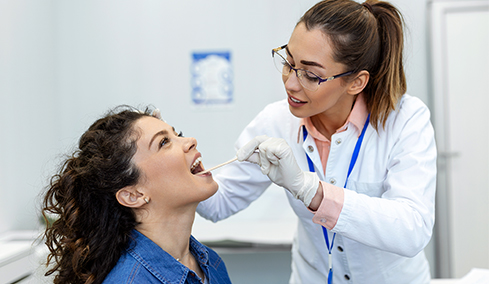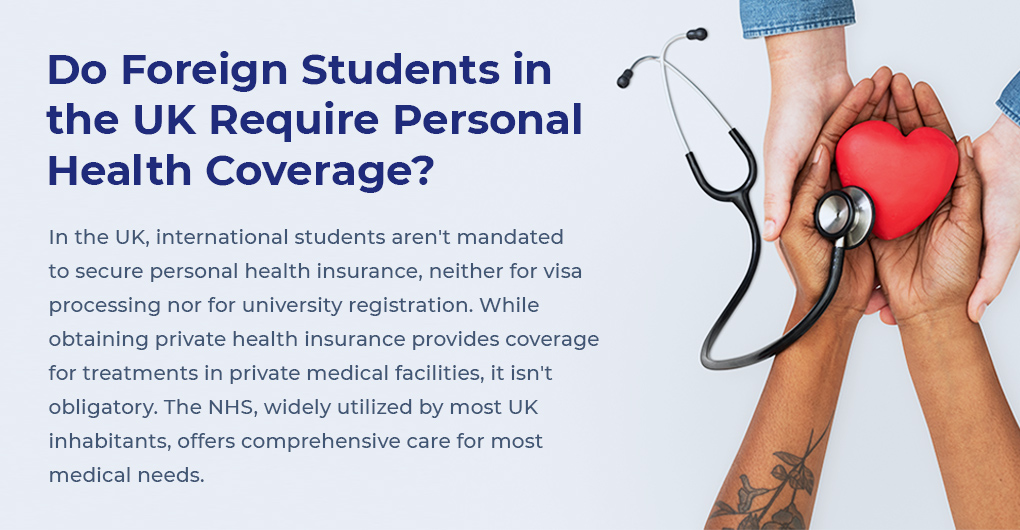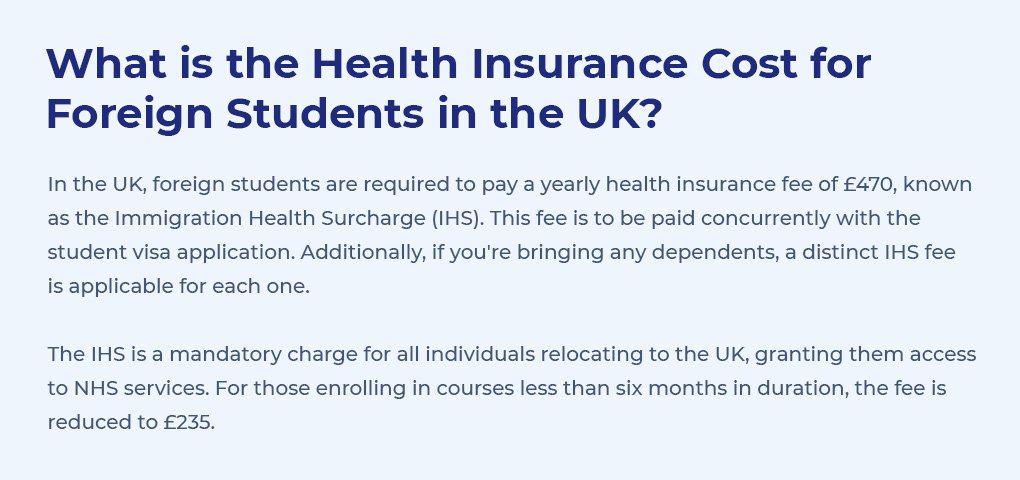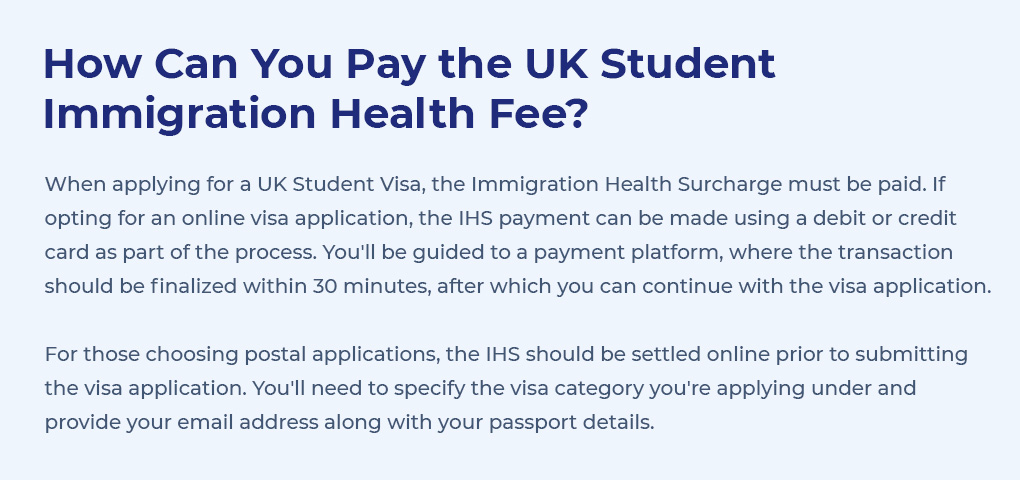

The UK, known for its rich history, academic excellence, and diverse culture, is also a global leader in healthcare. Its healthcare system, primarily led by the National Health Service (NHS), is one of the most comprehensive and accessible in the world. For international students choosing the UK as their study destination, understanding the available medical and healthcare facilities becomes crucial. This blog provides an in-depth look into what international students can expect in terms of healthcare facilities in the UK.
In this blog we will cover the following 10 topics:
Founded in 1948, the NHS is the publicly funded healthcare system of the UK. Its services are primarily free at the point of use, funded through taxation. It offers everything from general practitioner (GP) services to hospital care, making it a comprehensive system that ensures health security for its residents, including international students.

Navigating a new country’s healthcare system can be daunting for international students. However, the UK’s National Health Service (NHS) ensures that accessing medical care is straightforward and comprehensive for those coming from abroad. If you're planning to study in the UK, here's an elaboration on how you, as an international student, can access the NHS:
Before diving into the specifics, it’s vital to understand who qualifies for NHS services:
Click here to know more about IHS.
• General Services: Routine check-ups, consultations with your GP, necessary treatments, and even some surgeries are covered.
• Prescriptions: While prescriptions are subsidized, there might be a standard charge, unless you qualify for an exemption, which can apply in certain circumstances or based on specific criteria.
• Dental and Optometry Services: Basic NHS dental check-ups and treatments come with a fee, but they're often at a lower rate than private care. Eye tests and glasses, too, can incur a charge, but students might be eligible for discounts.
Not everything is free even if you're eligible for the NHS. Services like elective treatments, certain dental and optometry services, travel vaccinations, and cosmetic surgeries might not be covered or might come with additional costs.

Upon arrival and settling into your residence, it's advisable to register with a local GP (Doctors affiliated with the NHS are referred to as General Practitioners i.e. GP. They collaborate with fellow doctors, nurses, and administrative personnel in community clinics). They are the primary care providers, offering consultations, diagnostics, and referrals when specialist treatment is necessary.
Should you need specialized care or treatment, your GP will refer you to a hospital. The UK boasts some of the world's best hospitals, equipped with state-of-the-art facilities and expert professionals. Note: In emergencies, you can directly visit the hospital's Accident and Emergency (A&E) department.
While the NHS covers many dental and optometry services, they might not always be free. However, charges are heavily subsidized. For regular dental check-ups and treatments, it's best to register with a local NHS dentist. For eye care, many high-street opticians provide NHS services.
The UK is increasingly focusing on mental health, especially concerning students. Most universities offer counseling services, and GPs can refer students to specialized mental health services if needed.
NHS offers confidential sexual health services. This includes advice on contraception, STI testing, and other related concerns. Many universities also have onsite clinics or partnerships with local clinics to provide these services to students.
If your GP prescribes medication, you can get it from any local pharmacy. There's a standard prescription charge, but some students, depending on their circumstances, might be eligible for free prescriptions. It's essential to check your eligibility.
Even if you're eligible for NHS, it's a good idea to consider health insurance. This can cover services not included in the NHS, such as private treatments, quicker consultations, or repatriation to your home country if necessary.

The transition to studying in the UK can be a whirlwind of new experiences and challenges. While academics are a top priority, maintaining good health ensures that your student life remains enriching and fulfilling. Here are ten health tips that international students should consider:
1. Balanced Diet: The UK boasts a plethora of supermarkets, from large chains like Tesco, Sainsbury's, and Asda to local markets in almost every town. These establishments provide a vast range of fresh fruits, vegetables, and whole foods.
Tip: Plan weekly meals, incorporating various food groups. This not only ensures you're getting essential nutrients but can also save money.
2. Regular Exercise: The UK's educational institutions often come equipped with state-of-the-art sports facilities, making it convenient for students to stay active.
Tip: Beyond gym workouts, consider walking or cycling around campus or the city to both exercise and explore.
3. Limit Alcohol & Avoid Smoking: The social aspect of student life might introduce you to parties and gatherings where alcohol and cigarettes are present.
Legal Reminder: The UK legal age for drinking is 18. Also, smoking in public indoor spaces is banned. Always respect these laws.
Tip: Opt for non-alcoholic drinks if you choose to go out. They're often cheaper and won't leave you with a hangover!
4. Get Adequate Sleep: The rigours of student life can sometimes lead to late nights. Aim for 7-9 hours of sleep daily to rejuvenate both mind and body.
5. Stay Hydrated: Drink plenty of water throughout the day. The UK's tap water is generally safe to drink, but always check with your accommodation provider first.
6. Mental Health Matters: Universities often have counselling services and helplines. Don't hesitate to reach out if you're feeling overwhelmed.
7. Local Health Services: Familiarize yourself with the National Health Service (NHS) and local clinics. International students are typically entitled to certain NHS services.
8. Avoid Caffeine Overload: While the occasional coffee can help with studies, relying heavily on caffeine can lead to anxiety and poor sleep.
9. Join Social Groups: Engaging with cultural societies or interest-based clubs can provide a sense of community, helping combat feelings of homesickness or isolation.
10. Stay Updated with Vaccinations: Check with your university's health department for recommended or mandatory vaccinations for international students.
Remember, Your health, both mental and physical, plays a crucial role in determining the quality of your student experience in the UK. By following these tips, you can make the most out of your time abroad.
The UK's medical and healthcare facilities stand as a testament to the country's commitment to the well-being of its residents and international visitors. As an international student, understanding the healthcare landscape is essential, ensuring you have a safe, healthy, and fulfilling study experience in the UK. Always remember to register with local healthcare providers upon arrival, familiarize yourself with the services available, and make well-informed decisions about your health.

Studying abroad is an exciting and life-changing experience that offers students a chance to gain a global perspective and valuable exposure ...

In our rapidly globalizing world, where boundaries are melting away and opportunities abound, proficiency in the English language has become ...

Choosing to pursue higher education abroad is an exciting and life-changing decision. Among the plethora of options available to internationa...

Studying abroad is a life-altering adventure that opens doors to new cultures, experiences, and opportunities. Among the plethora of global s...

Australia, renowned for its world-class education and diverse cultural experiences, continues to be a favoured destination for international ...

Australia is not just famous for its iconic Sydney Opera House, the Great Barrier Reef, and its unique wildlife; it is also recognized global...

Studying abroad is a life-changing decision, and with so many options available, it can be overwhelming to choose the right country and univers...

As of March 2022, Australia has seen a consistent rise in its international student numbers, with enrolments reaching 440,219. This marks an ...